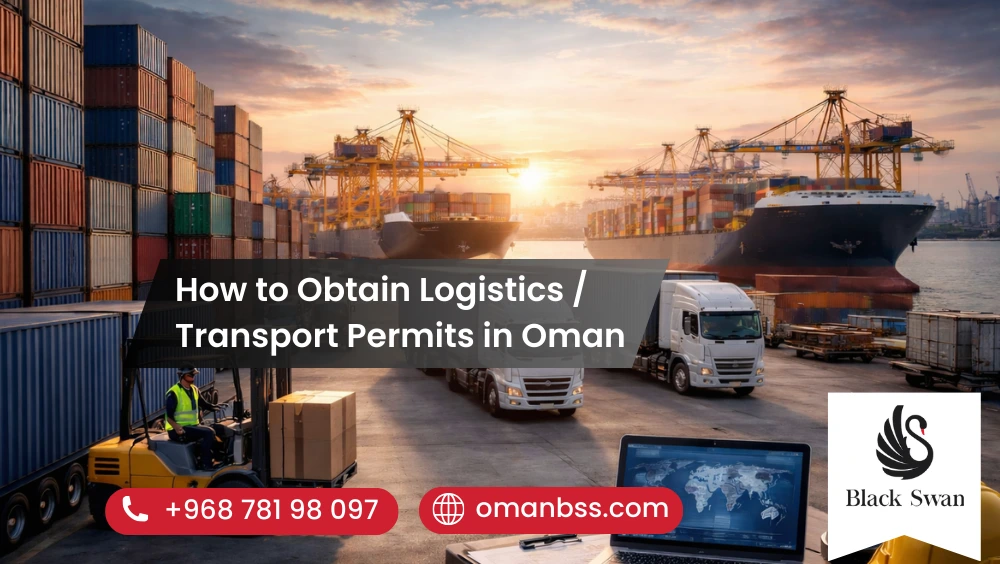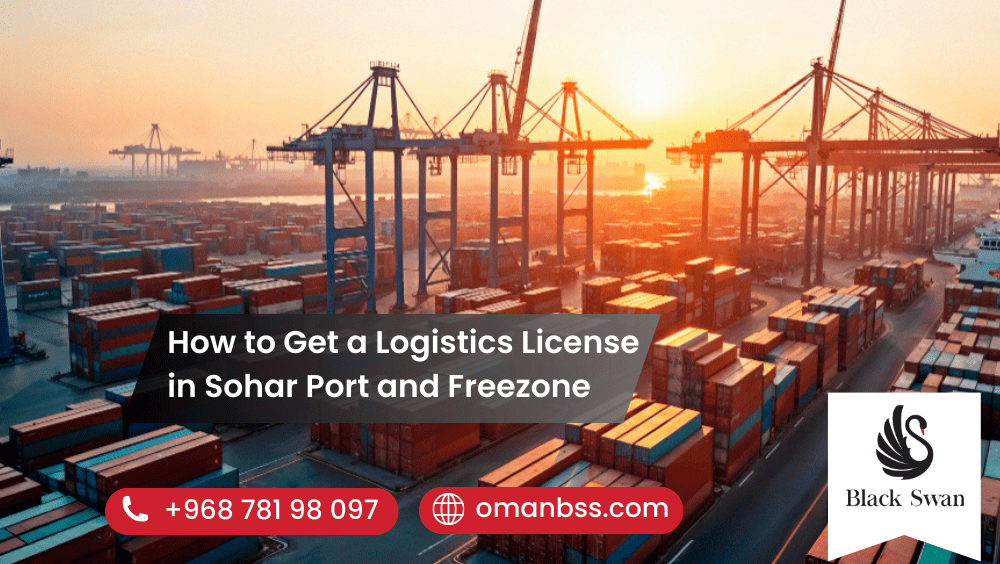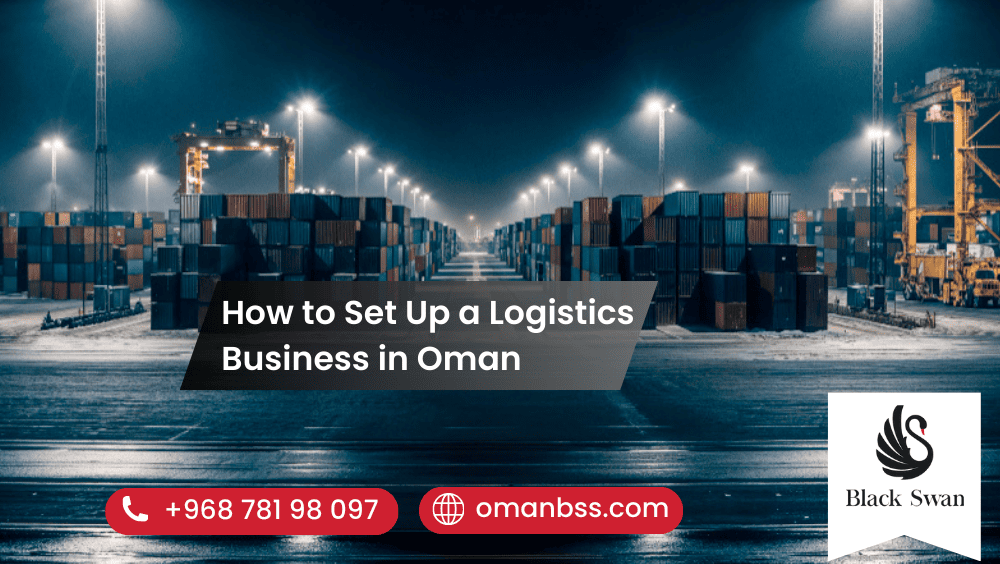Starting a logistics or transport company in Oman requires more than just buying trucks and hiring drivers. You also require the relevant licenses and transport permits that allow you to operate legally, move cargo more freely and prevent delays at checkpoints, ports or customer sites. The good news is that Oman has also been digitising most transport services, so the process is more direct than it used to be — as long as you take the right steps in the right order.
1) First, confirm your activity and company structure
You need to have the appropriate business activity and must be a legally registered entity before applying for any transport permits. The type of activity you choose in Oman is quite critical as permits are generally tied to your Commercial Registration (CR) and the respective approved types/activity (e.g., land transport, logistics services, freight forwarding).
Typical activities that may require permits:
- Goods transport (land): trucks, pickups, delivery vehicles
- Logistics services: warehousing + distribution + last-mile
- Freight forwarding: coordinating shipments by sea/air/land
- Special transport: heavy loads, oversized cargo, project cargo
Why this step matters:The right activity in your CR is crucial, as getting it wrong can cause permit applications to get rejected or remain stuck during the review process. Get details on Business Setup in Oman.
2) Complete company registration (CR) and base licenses
Think of this as your “foundation”. You may not get a transport permit without it.
Core items usually needed before transport permits:
- Commercial Registration (CR) and activity approvals (via the business registration system under the Ministry of Commerce, Industry & Investment Promotion)
- A valid office address / lease (commonly required for municipal approvals)
- Basic corporate documents (owners, authorised signatory, etc.)
- Municipality approvals where applicable (depending on location and activity)
Even if your transport permit is handled by a transport authority, they still need your company identity to match.
3) Understand the key authorities for logistics/transport permits in Oman
In Oman, logistics permits are not handled by one single department. Instead, permits depend on what you transport and how.
Main authorities you will deal with
- Ministry of Transport, Communications and Information Technology (MTCIT): regulates land transport and issues multiple transport licensing/permit services
- gov.om eServices: official portal listing transport services such as Vehicle Operating Cards and special permits
- Royal Oman Police (ROP): traffic-related approvals and escort requests for special road movements
- Oman Customs: permits related to cross-border land transport, foreign vehicles, and certain customs operations
4) The most common permit for goods transport: Vehicle Operating Card (VOC)
If you plan to transport goods commercially, a major requirement is typically the Vehicle Operating Card (often linked to operating your fleet under a licensed transport activity). The gov.om portal includes a service specifically titled “Get Vehicle Operating Card for Transporting Goods.”
What you should prepare (practical checklist)
While exact document requirements can vary by case and system updates, businesses commonly keep:
- Company CR details (and the relevant activity)
- Vehicle ownership certificate / registration details
- Customs card (where relevant for transport means) or registration request from the concerned authority (as indicated on the service description)
- Driver/vehicle compliance readiness (insurance, safety, etc.)
Tip: If you’re doing a fleet submission (multiple vehicles), have an accurate/clean spreadsheet of vehicle information available (plate #, make / model info, ownership status) to help with quick submissions. Looking for a Business Setup Consultant in Oman?
5) Special case: Exceptional / heavy / oversized cargo permits
Project cargo and oversized loads are treated differently because they can impact public road safety and infrastructure. MTCIT lists Exceptional Transport Permits under its licensing and permit services.
In addition, the gov.om portal includes a service titled “Get a Permit Without Escort”, and it references a key rule: the permit is granted if the vehicle/equipment/load weight does not exceed 46 tons, and heavier loads require additional approval.
When you typically need these permits
- Heavy machinery transport
- Oversized containers (non-standard dimensions)
- Construction and oil & gas project movements
- Long-load items (pipes, structural steel, transformers)
Why apply early: Route approvals and timing windows matter. Also, some loads may require extra safety planning. Obtaining an Industrial License in Oman.
6) If your movement needs road escort: apply via ROP
For certain high-risk movements (heavy, wide, or complicated routes), you may need a traffic escort. ROP provides an eService for requesting security escort of public roads and clearly outlines the typical submission data needed (supervisor details, civil number, CRN, route/time, vehicle/load).
This is a big advantage because it tells you what your internal operations team must prepare before clicking “submit.”
7) Cross-border land transport and foreign vehicle permits
If your business involves cross-border trucking (or foreign trucks entering/exiting Oman), Oman Customs shows permit services connected to the land transport department, including:
- Permit request for entrance of empty foreign land transport vehicles
- Permit request for exit of foreign land transport vehicles to non-registering country
- Permit to transport exceptional load (heavy)
So, if you’re managing GCC routes, international trucking, or project movements with foreign vehicles, plan your compliance around these permit types. Get details on Logistic Business Setup in Oman.
8) Permits and licenses for customs clearance and freight forwarding
Many logistics companies expand into freight forwarding and customs-related services. However, Oman Customs publishes requirements for a customs clearance license, including an important ownership condition: the company’s capital ownership must be fully owned by Omani citizens or GCC nationals, plus CR and Oman Chamber of Commerce membership, and the customs clearance activity must be included in the registered activities.
That means:
- If you are a foreign investor, you can still run a logistics business, but customs clearance licensing may require a different structure/partnering strategy.
- Alternatively, you may work with an authorised clearance partner while your company focuses on transport and logistics operations.
(Your setup strategy should match what you want to do in Year 1 vs Year 2.)
Related Articles:
» How to Register a Warehouse and Logistic Business in Oman?
» Starting a Logistics Business in Oman: Licenses and Requirements
» Logistics Business Opportunities in Oman
» How to Get a Logistics License in Sohar Port and Freezone?
» How to Set Up a Logistics Business in Oman?
9) Quick table: Common logistics/transport permits in Oman
Permit / Approval
Usually Needed For
Typical Authority
Commercial Registration (CR) + activity approval
Any logistics/transport business
MOCIIP / registration framework
Vehicle Operating Card (VOC)
Commercial transport of goods
gov.om / transport services
Exceptional transport permit
Oversized/heavy/project loads
MTCIT licensing services
Permit without escort (within limits)
Heavy transport that qualifies
gov.om service (46-ton reference)
Road escort request
High-risk or restricted movements
ROP traffic escort eService
Foreign vehicle entry/exit permits
Cross-border/foreign trucks
Oman Customs permit services
Customs clearance license
Clearing goods under your own license
Oman Customs (ownership conditions apply)
10) Common mistakes (and how to avoid them)
Even well-funded startups lose time due to small errors. Here’s what we see most often:
- Wrong activity on CR → permits don’t match your legal activity
- Incomplete vehicle documentation → VOC processing delays
- Applying for heavy-load permits without route planning → rework and resubmission
- Assuming customs clearance is same as freight forwarding → licensing mismatch (and ownership rules may apply)
- Ignoring escort needs → movement stopped on the road; schedule losses

11) How Oman Business Setup Service can help
To keep your launch smooth, our team typically supports:
- Selecting the correct logistics/transport activity
- Completing CR and base licensing checklist
- Assisting with VOC and fleet readiness planning
- Guidance for exceptional load permits and escort coordination
- Compliance mapping if you plan to add customs-related services later
FAQs on “Obtain Logistics / Transport Permits in Oman”
Yes. Commercial goods transport typically requires fleet/vehicle approvals such as a Vehicle Operating Card (VOC).
Numerous transport licensing/permit services are overseen and issued by the Ministry of Transport, Communications and Information Technology (MTCIT).
It is an operating approval tied to a vehicle used for transporting goods commercially, available as an official eService.
Yes. MTCIT includes Exceptional Transport Permits within its licensing and permit services.
It’s an official service; eligibility depends on weight limits. The service notes approval if the vehicle/equipment/load does not exceed 46 tons, and heavier cases need further approval.
When a movement poses higher road risk (route/time/load), you may need a security/traffic escort request via ROP.
ROP indicates data such as escort supervisor details, civil number, CRN of the transporting entity, plus route/time and vehicle/load details.
Yes. Oman Customs lists permit services for entrance/exit of foreign land transport vehicles and exceptional load transport.
For customs clearance licensing, Oman Customs lists an ownership requirement (fully owned by Omani citizens or GCC nationals)
No, freight forwarding manages shipments, and customs clearance is a regulated activity requiring licensing.
Ensure your CR activity matches your operation, and prepare clean vehicle documentation before applying for VOC and related approvals.
Yes—we can support the setup roadmap, document checklist, and coordination for VOC, special permits, and escort requirements based on your business model.

















